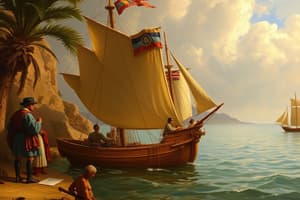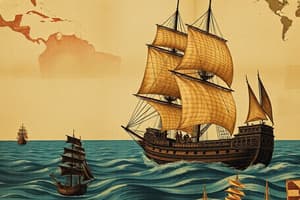Podcast
Questions and Answers
What impact did the European voyages of discovery have on indigenous peoples?
What impact did the European voyages of discovery have on indigenous peoples?
Displacement, enslavement, extinction, introduction of diseases, destruction of local cultures and societies
Who was Christopher Columbus and what is he known for?
Who was Christopher Columbus and what is he known for?
Pioneering explorer sponsored by Catholic Monarchs of Spain, known for voyages across Atlantic Ocean
What is the broader context of the Age of Exploration?
What is the broader context of the Age of Exploration?
Expansion of European powers, advancements in navigation, quest for new trade routes and resources
How did voyages of discovery become possible in the Early Modern Period?
How did voyages of discovery become possible in the Early Modern Period?
How did the Portuguese try to reach the Indies?
How did the Portuguese try to reach the Indies?
How did the Spanish try to reach the Indies?
How did the Spanish try to reach the Indies?
What impact did the European voyages of discovery have on indigenous peoples?
What impact did the European voyages of discovery have on indigenous peoples?
Who was the explorer associated with the Spanish strategy to reach the Americas by sailing westward across the Atlantic Ocean?
Who was the explorer associated with the Spanish strategy to reach the Americas by sailing westward across the Atlantic Ocean?
What defined the Age of Exploration?
What defined the Age of Exploration?
How did voyages of discovery become possible in the Early Modern Period?
How did voyages of discovery become possible in the Early Modern Period?
What were the primary strategies used by the Portuguese to reach the East Indies?
What were the primary strategies used by the Portuguese to reach the East Indies?
How did the Spanish attempt to reach the Americas?
How did the Spanish attempt to reach the Americas?
Study Notes
The European Voyages of Discovery in the Early Modern Period
The European voyages of discovery, particularly those taking place during the Early Modern Period, had a significant impact on the world's geographic knowledge and international politics. This period saw the expansion of European powers beyond their traditional borders, facilitated by advancements in navigation and the quest for new trade routes and resources. Here, we will discuss the impact of these voyages on indigenous peoples, notable figures such as Christopher Columbus, the broader context of the Age of Exploration, the role of commerce, and the strategies employed by the Spanish and Portuguese in their quest to reach the Indies.
Impact on Indigenous Peoples
The European voyages of discovery led to the colonization of many lands, which often resulted in the displacement, enslavement, or extinction of indigenous peoples. The introduction of European diseases to which the indigenous populations had no immunity greatly reduced their numbers. Additionally, the imposition of European systems of administration, economics, and religion often disrupted or destroyed local cultures and societies.
Christopher Columbus
Christopher Columbus, born in Genoa, Italy, was a pioneering explorer best known for his voyages across the Atlantic Ocean, sponsored by the Catholic Monarchs of Spain, Ferdinand II of Aragon and Isabella I of Castile. Despite initial failures to locate the East Indies, his expeditions resulted in the discovery of the Americas and the Caribbean Islands. Columbus's success inspired further European exploration and colonization, setting the stage for the Age of Exploration.
The Age of Exploration
The Age of Exploration, roughly lasting from the 15th to the 17th century, was marked by extensive maritime exploration, enabling Europeans to establish trading networks and territories in various parts of the world. Key achievements during this era included Vasco da Gama's journey to India, Ferdinand Magellan's circumnavigation of the globe, and John Cabot's attempts to find the Northwest Passage. These voyages significantly increased European knowledge of the world and contributed to the globalization of trade and culture.
Commerce and the European Voyages
Commerce played a crucial role in the European voyages of discovery. Trade motivated many of these expeditions, as European merchants sought to expand their markets and secure valuable resources. Loans from Genoese merchants funded ships and crews, and profits from slave sales and sugar production were used to repay these loans and fund further exploration. Additionally, the development of maps and navigational tools allowed Europeans to chart their own routes, leading to the discovery of new lands and resources.
How Did Voyages of Discovery Become Possible in the Early Modern Period?
Several factors enabled the European voyages of discovery to take place during the Early Modern Period. Technological advancements in shipbuilding, navigation, and cartography made longer journeys possible. Economic factors such as the desire for trade routes and the availability of capital also played a role. Additionally, political motivations, including the pursuit of territorial claims and religious expansion, drove European powers to explore beyond their borders.
Portuguese Strategies to Reach the Indies
The Portuguese, under the leadership of Henry the Navigator, sought to reach the East Indies by sailing southward along the African coast. Their primary objective was to establish a sea route to India, bypassing the overland Silk Road controlled by the Ottoman Turks. They faced challenges due to the lack of knowledge about the southern tip of Africa, but eventually, Vasco da Gama succeeded in reaching India via the Cape of Good Hope.
Spanish Strategies to Reach the Indies
The Spanish strategy to reach the Americas involved sailing westward across the Atlantic Ocean. Christopher Columbus believed he could find a faster route to the East Indies by sailing west instead of the traditional eastward journey. Although he initially failed to locate the Indies, his voyages led to the discovery of North America and expanded Spain's global influence.
In conclusion, the European voyages of discovery during the Early Modern Period significantly impacted geographic knowledge, international relations, and commerce. The Age of Exploration saw the expansion of European empires, which often came at the expense of indigenous peoples and their cultures. Key figures like Christopher Columbus played crucial roles in these voyages, while advancements in technology and economics facilitated the exploration of new lands and the establishment of trading networks. Despite the challenges and controversies surrounding these expeditions, the European voyages of discovery set the stage for the modern world we know today.
Studying That Suits You
Use AI to generate personalized quizzes and flashcards to suit your learning preferences.
Description
Test your knowledge on the European voyages of discovery during the Early Modern Period, exploring the impact on indigenous peoples, key figures like Christopher Columbus, the Age of Exploration, the role of commerce, and strategies employed by the Spanish and Portuguese. Learn about colonization, trade routes, technological advancements, and the globalization of trade and culture.




